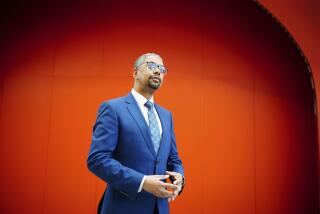Far-right British politician Nigel Farage talks Islam, ‘Brexit’ and whether there’s a rise in hate crimes

Nigel Farage, the far-right politician who founded Britain’s UK Independence Party, was the mastermind behind Britain’s vote to leave the European Union.
The 54-year-old dedicated his career to campaigning for “Brexit.” In fact, he’d been advocating it since 1999.
After his victory, Farage began to help Donald Trump’s campaign during the 2016 presidential election. He had known Stephen K. Bannon, a Trump advisor who would briefly become a senior White House aide, for years.
Farage’s nativist vision and populist messaging, especially toward immigration, are strikingly similar to the views of President Trump.
Farage spoke with The Times about Brexit, Islam and his role in politics. The interview, which took place at Chapman University in Orange, has been edited for length and clarity.
Brexit was your dream come true. Yet, you decided to leave politics after Britons voted to leave the European Union. Why?
That’s not true. I still lead a group in the European Parliament, so I’m still active in politics. But I left frontline British politics in terms of leading the UK Independence Party because the mission was done. I wasn’t in it for a career. I came from business into politics to try to change something. And at that moment in time it appeared it was done. So I said thank you very much.
Was it hard to resign as leader of the UK Independence Party?
It was dead easy. I’m not your normal political figure. Most people in politics are in for the long term or because they want to be prime minister or president. I got into it because I had a great cause. I felt that that this European question had been swept under the carpet. These issues about sovereignty weren’t being discussed and I wanted to try to change the direction of my country and I did. And I’m very happy.
How has UKIP changed since you resigned as its leader in 2016?
It’s not doing well. In the eyes of some, it’s become a bit anti-Islam. I’m concerned about Islamism, but I’m not concerned about the religion of Islam. Also, when you have a political movement that’s got a dominant figure, once that person is gone it’s always going to be tough moving forward.
What about Islamism worries you?
The worry about Islamism is that those who adhere to that in the U.K. don’t accept U.K. culture, don’t accept U.K. law. They want to impose their version of the world upon the host country. And that would lead us toward disaster. It doesn’t work. I’m very specific that I’m not against the religion, I’m not against Islam. There is a danger that if the right goes too far to the right it starts to become confrontational.
In the U.S., some might say that President Trump or Steve Bannon are examples of the far right and how it has become anti-Islam.
Well actually if you sit down and talk with Steve Bannon, he’d tell you that Islam is one of the great religions in the world that’s been perverted by a few people. Steve has said that very clearly. There are a lot of voices building in America and elsewhere who think that all adherence of Islam is bad and that is a very dangerous place. That’s not where we need to be.
You gave a defiant speech at the European Parliament after the country voted to leave the European Union. What was that like?
The whole two or three days after was almost like a daze. I remember weeks later coming to the office and asking if we had really won. It seemed impossible for so long. It was fantastic and amazing. I didn’t know what the reaction would be at the European Parliament. I thought that for once they’d treat me with respect. But no, they couldn’t do that. When I got up, they started booing, and so I thought, “The hell with it.” It was the achievement of a dream that looked impossible. I was on my own for years, so it was an amazing few days.
Brexit won, but by a small margin. Do you consider it a victory?
It was a huge victory. We had the whole world against us. The whole global order was telling us that we’d be reduced to living in caves and plagues of black locusts would descend upon our lives. And we still said, “The hell with you. This is what we want to do.” It was a huge victory. We are struggling with it a bit, but I still think we will leave on March 29 of next year.
Do you believe in a second referendum?
No, it’s not necessary. But if it comes I will fight it. I would hate to see that. The breakdown in trust of our democratic system would be very severe.
Are Europe and the United States shifting away from liberal democracy and more toward illiberal democracy?
Depends how you define liberal. This idea that somehow Trump wants to crash democracy is ludicrous. The executive branch in America has tremendous power and that’s true, but what is liberal democracy? All liberal democracy has done is to hand decisions to a whole host of global organizations instead of would-be voters. I think so-called liberal democrats have forgotten one thing, which is their duty to the people in their country and not to the rest of the world.
What are the similarities between the election of Trump and Brexit?
I think Trump was a similar phenomenon to Brexit in the sense that it was the little people saying we are going to do something about this, and they did, much to the shock of the corporate establishment. It was a feeling that life had been too easy for the big corporations and that Washington was a swamp for lobbyists.
Some reports suggest that there was a rise in hate crimes after Brexit.
Absolute lies. There was a story that appeared on BBC about a Polish guy who got punched, falls down and hits his head and dies. They even interviewed someone who said that Nigel Farage had blood on his hands. I was appalled. A year later it goes to trial. What had happened? The Polish guy tried to a hit a black kid and the black kid had tried to defend himself. Completely 180. Did I get an apology? No. So I don’t buy any of this stuff. I don’t buy it. How is wanting to assert your rights of national democracy and independence in any way a hateful thing? It’s a normal thing. It makes me quite angry, actually.
What do you think of Trump pulling out of the Iran nuclear deal?
I understand the reason why the Iran deal was struck. And I understand the logic that if you break sanctions, you allow more liberal forces into a country [and] they themselves actually look toward the outside world. I understand the argument; however, I’m sorry to say that it hasn’t worked at all. It’s turned a bad Iranian regime even worse and they’ve used the financial benefit of the Iran deal to spread their hate and poison through Hezbollah all across the region, so actually the Iran deal was well intentioned and I understand why President Obama did it. I understand why the Europeans supported it. It worked out completely opposite, so I believe that what Trump did was entirely right.
Follow me on Twitter @melissaetehad
More to Read
Start your day right
Sign up for Essential California for news, features and recommendations from the L.A. Times and beyond in your inbox six days a week.
You may occasionally receive promotional content from the Los Angeles Times.







